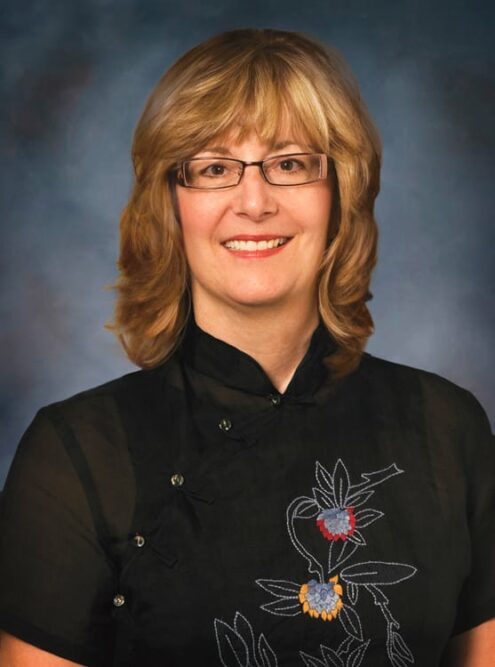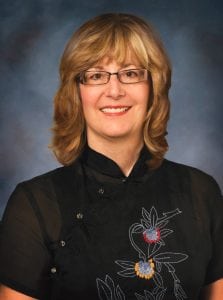
Home » CEO Q&A with Jeanne Dillner
CEO Q&A with Jeanne Dillner

June 14, 2018
 Jeanne Dillner, CEO of SIGN Fracture Care International
Jeanne Dillner, CEO of SIGN Fracture Care InternationalBrief background of business:
SIGN Fracture Care International is a humanitarian organization based in Richland. Our mission is to give the injured poor in developing countries access to affordable orthopaedic surgery. We accomplish this by providing surgeons in these countries with orthopaedic education along with implants and instruments designed for use in austere operating rooms.
Number of employees you oversee: 42
How did you land your current role?
I was a consultant for the organization in 1999, the year of incorporation. In January 2001, the original CEO departed to return to seminary and I was asked to replace him.
What is your main goal for your organization this year?
Develop a research and development cell so that we can iterate ideas for new products faster and allow the production department to focus on producing higher quantities needed to address the rise in demand for our products.
Why should the Tri-Cities care about the manufacturing industry?
Manufacturers make products that improve people’s lives. Manufacturers create family wage earning jobs for machinists, engineers, logistics, sales, business administration and more.
What is one characteristic that you believe every leader should possess?
Just one? Some of my favorites are listening, decision-making, visioning skills, and being grateful and empathetic. The one characteristic that I believe is most important is respect. Respect for myself, for my talented staff, for our founder and board, and for the surgeons in developing countries who work endless hours to care for their patients.
What is the biggest challenge facing business owners/managers today?
It is hard for me to answer the question for other business owners and managers. I would imagine most of us face challenges by any increase in regulatory requirements. For us, it is changes to FDA requirements and the recent tariffs on medical grade implant steel. Both increase our costs, which we cannot pass onto our customers because we donate our products in developing countries. Another challenge is preparing our staff to be alert for and accepting of change so that we can address the increasing need for our existing implants and at the same time expand the breadth of implants we provide.
What advice would you give someone going into a leadership position?
You are the energizer for your company or department. Your staff look to you for leadership and guidance. It is important to take care of yourself so that you have the stamina and enthusiasm for your work and personal life. There will always be an endless to-do list. Share the workload and responsibilities; your staff love to have meaningful responsibility and the freedom to use their intellect to accomplish the tasks or goals. If it is a new company, get the funding to hire the folks with the skills and experience that you do not have. Implementation of your ideas and vision will be much faster and you will gain energy from their ideas and enthusiasm.
Who are your role models or mentors?
From people who are living today: Dr. Lewis Zirkle for his creativity, vision, passion, energy and willingness to provide guidance as I continue to grow as a CEO. The other is Randall Huebner, founder of the medical implant company Acumed. He is a source of encouragement and hands-on knowledge about running a design and manufacturing company. Both men set an excellent example to me of being humble and lifelong learners. I am grateful to them for their patience, guidance and support.
From historical figures: Eleanor Roosevelt. Despite the fact that her personal life was troubled, she led an incredibly active and productive professional life. As first lady, she championed the rights of the poor and underrepresented, at times in opposition to the president. She was unanimously voted in as the original chair of the commission on human rights of the United Nations. In this role, she traveled to Europe, Asia, the Middle East, and the Pacific, investigating conditions of the poor and urging both support for the U.N. and U.N. humanitarian and diplomatic aid. She used her writing and developed speaking skills to support her husband’s presidency and to tell the world about the needs of the disadvantaged. Women like Eleanor Roosevelt cause me to realize that my placement in this position is for a much bigger purpose. This knowledge gives me encouragement to keep at it when at times I wish that I had a “normal life.”
How did you decide to pursue the career that you are working in today?
I learned as a teenager that I loved production when I worked at the Salem Del Monte food processing plant in the summers to save up for my college tuition. I loved being around the machines and thinking of processes that would improve the flow.
I chose to get a degree from Portland State University in business administration with an emphasis in accounting. This type of degree would give me the skills needed to get a job anywhere I lived.
I fell into the position of CEO for SIGN. I had just returned from working at the IAEA in Vienna, Austria. Every three weeks I returned to Vienna to provide business consulting to the CTBTO, which was a new startup agency. When in the USA, I took on other start-up clients to help them set up their business systems. In February 1999, my friend Ron Liikala told me about a nonprofit startup that needed my skill set. Ron learned about the opportunity from his orthopaedic surgeon, Dr. Zirkle. While removing a pin from Ron’s broken thumb, Dr. Zirkle described his vision for a nonprofit company that would create equality of fracture care in developing countries — and the need he had for a person who was experienced in business administration.
A few days later I met with my predecessor, Dan Wodrich, and joined the team as a consultant to help set up their business systems. In early 2001, Dan decided to step down to return to seminary. Dr. Zirkle asked me to take Dan’s position. What I thought would be a one- or two-year position has essentially turned into my life’s work. It is a great honor to hold this position and to work with the staff, board and SIGN surgeons around the world to expand our reach to the injured poor.
How do you keep your employees motivated?
In the end, it is not just money that motivates people, though we do our best to pay our staff a family wage. People are motivated when they have interesting and challenging duties and responsibilities that contribute to a meaningful mission. They enjoy working in a collaborative and supportive environment and being recognized and encouraged by co-workers and company leaders for their efforts.
How do you measure success in your workplace?
We measure our success by the number of patients who receive SIGN surgery. Last year we celebrated the surgery of the 200,000th patient treated with a SIGN implant. Every orthopaedic implant we send out the door means another patient quickly heals from a broken bone, avoids lifelong disability, and that patient’s family can remain on the path that leads them out of poverty.
What do you consider your leadership style to be?
Very early in my career I read that a successful CEO must be a chameleon. Leaders have to become what the company needs us to be. Typically, I am a collaborative leader, a guider. When that does not work, I will make a decision to move forward on an initiative and pull the troops along with me. When I sense that the staff are on board, I move back to collaborator and let the staff develop the vision for the next steps and gain momentum from their visions. All good leaders must know the skills of the people they work with and must learn to be excellent teachers. I am still learning.
How do you balance work and family life?
I try to be aware of where I spend my time and make sure I look for opportunities to keep balance in my life. My time is tipped toward the work side because I love what I do, and enjoy spending time with the people I work with.
What is your best time management strategy?
Take care of my spiritual, mental and physical statuses first. Be happy with what I can accomplish each day.
What do you like to do when you are not at work?
I enjoy walking along the river with my two Golden Retrievers, photography, singing in my church choir and meeting with my friends and family.
Best tip to relieve stress?
Do something you love with someone or some being you love. I take morning walks along the river with my dogs and do something creative each day. My creative go-to is to take photos of whatever catches my eye and post on Facebook to see what gets the most likes.
Q&A Local News Manufacturing
KEYWORDS june 2018





